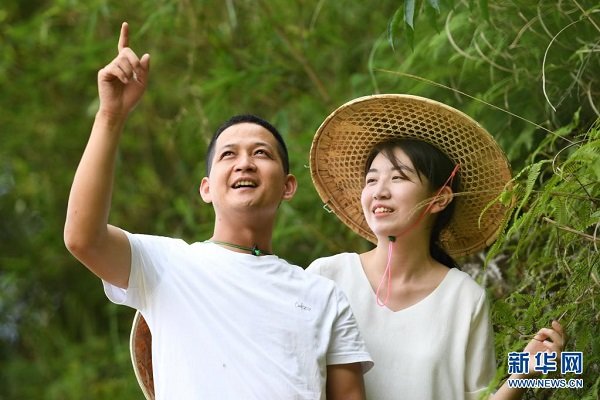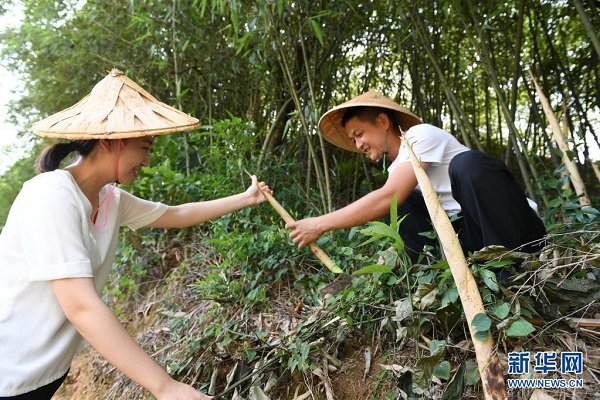University Graduates Return Home to Develop Ecological Farming
 |
| Ke Jiahua and Zhou Xi [Xinhua/Lin Shanchuan] |
Ke Jiahua and Zhou Xi, his wife, both graduates of Tongji University (in East China's Shanghai Municipality), in recent years have put much effort into developing ecological farming in Ke's hometown, a village in Nanjing (a county in Zhangzhou, a city in Southeast China's Fujian Province). The couple has also helped the residents promote, online, their ecological agricultural products. As a result, the products have become popular among many urban residents. The couple has realized their potential as "new farmers," as they have stuck to their dream of promoting rural vitalization.
In 2010, when he was a sophomore at the College of Transportation Engineering, under Tongji University, Ke set up a students' agricultural society, and led its members in developing a small farm (at the school). In 2012, shortly after he graduated, he began studying organic farming technologies at the university's ecological park. During the following year, he established an agri-entertainment base (in the park), which offered urban residents a variety of "entertainment farming" options, such as crop patches and farm stores.
Zhou, a native of Shanghai, fell in love with Ke while she was a student at the College of Economy and Management, under Tongji University. In 2018, the couple returned to Nantang (a village in Nankeng, a town in Nanjing), Ke's home village. Many of the villagers asked the couple why they gave up the opportunity to work in Shanghai, and some expressed doubt the couple could stick to the hard work.
Ke, who was born into a farmer's family, has considered agriculture a lifelong, experimental learning project. "I majored in marketing … The essential task of marketing personnel is to work as a bridge, through which their potential customers may learn detailed information about the products of the personnel's enterprises," says Ke.
In addition to helping farmers (in Nankeng) sell their agricultural and sideline products in Shanghai, and in other large cities, the couple during the past few years has taught the farmers how to cultivate organic vegetables and fruits. As an increasing number of farmers have increased their families' incomes by growing organic plants, more and more urban residents (in various regions of the country) can buy organic agricultural products via online platforms.
Ecological farming is a pioneering, practical development that aims to create globally sustainable land-management systems, and to encourage review of the importance of maintaining biodiversity in food production and farming products.
Some people, who thought the couple's endeavors to promote ecological farming might not end well, tried to persuade the couple to use chemical fertilizers, so the vegetables and fruits would grow vigorously. As the saying goes, "Facts speak louder than words." The couple wants to prove, with their actions, that their efforts (to promote ecological farming) are correct, and sensible.
The couple snapped many photos of crops, poultry, soil and spring water, so they could record the creatures, soil and water's characteristics. "In my eyes, all the animals and vegetables are my family members," says Zhou.
In 2020, the couple began selling their agricultural products through live online shows. The couple also broadcast, via online videos, Nantang's beautiful scenery and their traditional production methods. As a result, demand for more than 30 varieties of pollution-free vegetables, cultivated by the couple, has exceeded supply in many of China's large cities.
 |
| Ke Jiahua and Zhou Xi [Xinhua/Lin Shanchuan] |
(Source: Xinhua/Women of China English Monthly June 2021 issue)
Please understand that womenofchina.cn,a non-profit, information-communication website, cannot reach every writer before using articles and images. For copyright issues, please contact us by emailing: website@womenofchina.cn. The articles published and opinions expressed on this website represent the opinions of writers and are not necessarily shared by womenofchina.cn.






.jpg)

 WeChat
WeChat Weibo
Weibo 京公网安备 11010102004314号
京公网安备 11010102004314号